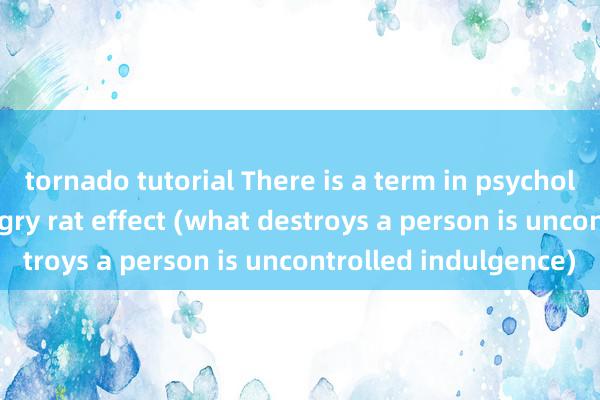发布日期:2024-11-11 03:42 点击次数:51

Pictures tornado tutorial
Daily update at 19:07. How long have you not controlled your desires?In a famous laboratory, a starving rat is facing a tempting button. It has learned that every time it presses the button, it will get a little food. This is a positive feedback mechanism that helps the rat get food when hungry and survive. But this time, the experimenter added substances that can make rats addicted to food. The results are shocking: the rat began to press the button non-stop until it was exhausted and fell into the pile of food in front of it, and finally died from overeating. This is the core of the "Starving Rat Effect": desire is out of control and leads to destruction.
Pictures
When the rat loses control of its own desires, hunger is no longer the only driving force, but a sense of addiction deeply embedded in its brain. It presses the button again and again, immersed in short-term satisfaction, and gradually loses itself.
1
Metaphors of human society
Perhaps you think this is just a lab rat, too far away from our lives. However, the hungry rat effect is actually lurking around each of us, even deep in our hearts. When we face desires - whether it is the pursuit of material things, the control of power, or the satisfaction of emotions, we will be like the hungry rat, facing the temptation of unbridled indulgence.
Psychologist Freud mentioned in his id theory that there is a primitive driving force deep in the human heart, that istornado tutorial, desire. It is unconscious, primitive, and always longs to be satisfied. Whether it is money, power, or emotions and pleasure, the id is driving humans to pursue these external stimuli. Once out of control, we will be like the rats in the experiment, indulging in short-term pleasures, but gradually losing self-control and eventually going to destruction.
Picture
2
Why does indulging desires destroy us?
From a psychological perspective, the self-control mechanism of human beings is controlled by the prefrontal cortex of the brain, which is responsible for rational thinking, judgment and behavior regulation. However, when we indulge in indulgence for a long time, such as overconsumption, gluttony, addiction to social media or games, the self-control mechanism of the brain will gradually weaken. This indulgence not only consumes our psychological energy, but also makes us lose ourselves in short-term pleasure and ignore long-term goals and personal growth.
3
Dopamine: The chemical balance of pleasure and destruction
Scientific research shows that dopamine is a chemical in the brain related to pleasure and reward. It helps us feel achievement and happiness. Howevertornado tutorial, excessive stimulation can lead to an imbalance in the dopamine system, making us become more and more dependent on external stimulation. Just like the hungry mouse, pressing the button again and again, seeking more pleasure.
This imbalance will gradually make us lose interest in life and unable to enjoy the beauty of the ordinary. Over time, we will fall into the trap of pleasure and feel more and more empty and tired.
4
How to escape the trap of the hungry rat effect?
To escape the trap of the hungry rat effect, psychologists recommend strengthening self-control through mindfulness and behavioral self-discipline training. Mindfulness practice can make us more aware of our inner desires so that we are not enslaved by them. At the same time, setting reasonable goals and behavioral boundaries can help us resist external temptations and avoid falling into uncontrolled indulgence.
Imagetornado tutorial
In addition, cultivating healthy living habits, such as regular exercise, good sleep, and establishing healthy emotional connections with others, can help restore the balance of the brain, so that we no longer blindly pursue short-term stimulation, but can enjoy every moment of life.
Image
Desire is a double-edged sword
Psychological self-help
Desire itself is not terrible, just as the hunger of hungry rats is a natural reaction to survival. But what is terrible is how we deal with these desires. If we can maintain moderate satisfaction and reasonable moderation, desire will become the driving force that drives us forward. On the contrary, if we allow desires to dominate our lives, we may end up like the hungry rat in the experiment, being devoured by desires and losing control of our lives.
Question Interaction
Have you ever had an experience where you could not control yourself in the face of a certain desire? Did that feeling of powerlessness make you panic? And what finally helped you find your balance? Share your story, maybe you are not alone in this fight.
References1. Freud, S. (1923). The Ego and the Id. New York: W. W. Norton & Company.
2. Baumeister, R. F., & Tierney, J. (2011). Willpower: Rediscovering the Greatest Human Strength. Penguin Books.
3. Schultheiss, O. C., & Wirth, M. M. (2018). Neuroscience of Motivation and Emotion. Elsevier.
Picture
Picture
There is a term in psychology called: Zeigarnik effect (being "kidnapped" ” attention)Picture
There is a term in psychology called: Late Night Effect (Is your impulse at night really unavoidable?)Picture
There is a term in psychology called: Exposure effectImage tornado tutorial
There is a term in psychology called: Ice cream effect. This website only provides storage services. All content is posted by users. If you find harmful or infringing content, please click Report.